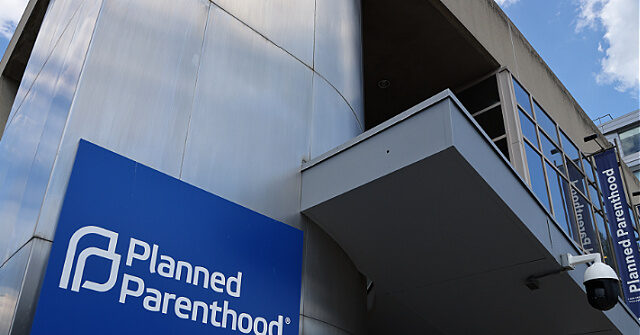A federal appeals court on Thursday blocked a lower court order mandating taxpayer funding for abortion giant Planned Parenthood.
A three-judge panel for U.S. Court of Appeals for the First Circuit, all appointed by former President Joe Biden (D), ultimately allowed a congressionally approved measure stripping Planned Parenthood of taxpayer dollars through Medicaid to go forward as litigation continues. The order stays two July preliminary injunctions issued by Obama-appointed U.S. District Judge Indira Talwani, which blocked the defunding measure from going into effect.
“Notwithstanding the contrary conclusion reached by the district court after its careful consideration of the matter, we conclude that defendants have met their burden to show their entitlement to a stay of the preliminary injunctions pending the disposition of their appeals of the same,” wrote Judges Gustavo Gelpí, Lara Montecalvo, and Seth Aframe.
“The motion is GRANTED. The July 21, 2025 preliminary injunction and the July 28, 2025 preliminary injunction are hereby stayed pending disposition of the respective appeals,” they continued.
Republicans passed a measure in this summer’s “Big, Beautiful Bill,” stripping Planned Parenthood of taxpayer funding through Medicaid for one year. Defunding abortion providers through the reconciliation process allowed the Senate to bypass the critical 60-vote threshold for a simple majority vote, instead capitalizing on Republicans’ overall trifecta. While federal funding for abortions is barred by the Hyde Amendment — except in cases of rape, incest, or life of the mother — pro-life advocates argue no federal funds should be used to prop up any organization that performs abortions.
Planned Parenthood immediately filed a lawsuit, alleging that the measure is unconstitutional and that Congress targeted Planned Parenthood out of other abortion providers in how it wrote the provision. While the provision does not explicitly name Planned Parenthood, the organization is one of the only abortion providers that falls under the restrictions outlined in the bill.
Planned Parenthood also argued in its lawsuit that having its Medicaid funding cut off would have “devastating effects” on the organization. Planned Parenthood has claimed that nearly 200 of its clinics are “at risk of closure” because of the defunding measure.
RELATED: Dozens of Planned Parenthood Clinics Closed in 2025
Talwani quickly granted a preliminary injunction, partially blocking the defunding provision for a subset of clinics that did not independently meet the provision’s “prohibited entity” definition: [Planned Parenthood Federation] members that do not provide abortions because of state law or those who received less than $800,000 in Medicaid reimbursements in 2023.
A week later, she issued another injunction essentially mandating Medicaid funding for all Planned Parenthood clinics as litigation continued. She wrote in her order that “patients are likely to suffer adverse health consequences where care is disrupted or unavailable.”
“In particular, restricting Members’ ability to provide healthcare services threatens an increase in unintended pregnancies and attendant complications because of reduced access to effective contraceptives, and an increase in undiagnosed and untreated STIs,” she wrote.
Talwani added that the court is “not enjoining the federal government from regulating abortion and is not directing the federal government to fund elective abortions or any healthcare service not otherwise eligible for Medicaid coverage.”
She wrote:
Instead, this order grants preliminary relief that prevents Defendants from targeting a specific group of entities—Planned Parenthood Federation Members—for exclusion from reimbursements under the Medicaid program where Plaintiffs have established a substantial likelihood that they will succeed in establishing that such targeted exclusion violates the United States Constitution, and where Plaintiffs satisfy the remaining requirements to obtain a preliminary injunction.
The Department of Health and Human Services (HHS) previously argued in its opposition to Planned Parenthood’s lawsuit that the abortion organization “has no right to taxpayer money” and the district “court should not invent such a right.”
“The Court should uphold Congress’s lawful exercise of its authority to decide to whom it will entrust taxpayers’ hard-earned dollars,” the filing reads.
Leading pro-life organization Susan B. Anthony Pro-Life America released a statement praising the First Circuit for “shut[ting] down Big Abortion’s desperate money grab.”
“The American people, through Congress, spoke clearly with the One Big Beautiful Bill Act. Taxpayers should not be forced to spend a dime funding a brutal industry that ends at least 1.1 million lives a year, harms women while providing dwindling, substandard health care services, and engages in partisan political activism – especially when more accessible, more comprehensive options outnumber Planned Parenthoods 15 to 1,” SBA Pro-Life America President Marjorie Dannenfelser said. “We are confident the Trump administration will prevail against the abortion industry’s lawfare.”
Planned Parenthood’s most recent annual report revealed record abortions and taxpayer funding in 2023-2024.
The report, called “A Force For Hope,” states that 402,230 unborn babies were killed in abortions, up from 392,715 the previous year. At the same time, the organization received $792.2 million in taxpayer funding, up almost $100 million from the previous year.
In June, the Supreme Court separately ruled that South Carolina could block Planned Parenthood from receiving Medicaid funds, finding that Planned Parenthood could not sue the state under a civil rights law.
The case is Planned Parenthood Federation of America v. Robert F. Kennedy Jr., No. 25-1698 in the U.S. Court of Appeals for the First Circuit.
Katherine Hamilton is a political reporter for Breitbart News. You can follow her on X @thekat_hamilton.

















